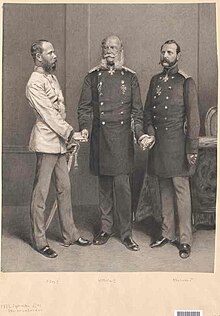Three emperor agreement
The three emperor agreement was a consultative pact between the three monarchies of Russia , Austria-Hungary and the German Empire .

It was signed on October 22nd, 1873 in Schönbrunn Palace in Vienna by Emperor Wilhelm I , Emperor Franz Joseph I and Emperor Alexander II . The Three Emperors Agreement was based on a military convention signed on June 6, 1873 between the Russian and Austrian emperors ( Schönbrunn Convention ), which Wilhelm I joined on October 22, 1873.
The agreement was concluded in order to secure the state of peace currently prevailing in Europe, to secure it against all tremors, from whichever side they may come, and to enforce it if necessary . But it was primarily just a promise of the three rulers to resolve any differences through direct and personal communication . It was not a guarantee pact, but it became the cornerstone of Otto von Bismarck's alliance policy . Apart from a few vague remarks about the spread of socialism in Europe, the Three Emperor Agreement was nothing more than a well-intentioned display of will based on the convictions of conservative solidarity . For Otto von Bismarck , it prevented a possible isolation of Germany at a low diplomatic price.
The agreement was reached by Bismarck in order to have both parties under better control and to prevent Russia from rapprochement with France . Bismarck thus achieved an important goal of his foreign policy, namely the isolation of France.
Bismarck's foreign policy failed in the Balkan crisis (1876–78). Because the agreement broke when Russia began to support the insurgents in the European part of the Ottoman Empire . From the perspective of Great Britain and the Austro-Hungarian Monarchy, Russia took too little consideration of their interests.
In 1881 Bismarck tried again to prevent Russia's rapprochement with France by renewing the treaty, which resulted in the so-called Three Emperor League. This alliance was part of the Bismarckian alliance system and obliged the three powers to be benevolent neutrality, in the event of an unprovoked attack on one of the powers by a fourth power. In view of the worsening antagonism between Austria and Russia in the Balkans, its extension had already become impossible in 1887.
To compensate and to counter the rapprochement between France and Russia, the so-called reinsurance treaty was concluded with the Russian Empire, which obligated Germany and Russia to benevolent neutrality in the event of an unprovoked attack by France against Germany or Austria against Russia.
Individual evidence
- ↑ Jutta Pemsel: The Vienna World Exhibition of 1873. The Wilhelminian Vienna at the turning point. Böhlau, Vienna / Cologne 1989, ISBN 3-20505-247-1 , p. 81.
- ^ Hajo Holborn : German history in modern times. The Age of Imperialism (1871 to 1945). (= German History in Modern Times Volume 3) Oldenbourg Wissenschaftsverlag, Munich 1971, ISBN 3-48643-251-6 , p. 4; and Volker Ullrich : The nervous great power. Rise and fall of the German Empire 1871–1918 . Fischer-Taschenbuch-Verlag, Frankfurt am Main 1999, ISBN 3-596-11694-5 , p. 77.
- ↑ Klaus Hildebrand : The past realm. German foreign policy from Bismarck to Hitler 1871–1945. Oldenbourg Wissenschaftsverlag, Munich 2008, ISBN 978-3-486-58605-3 , p. 27; and Gordon A. Craig , Karl Heinz Siber: German History 1866-1945. From the North German Confederation to the end of the Third Reich. Beck, Munich 1999, ISBN 3-40642-106-7 , p. 126.